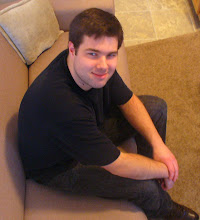Title: [Rec]
Year of Release: 2007
Date Viewed: September 22nd, 2010
MPAA Rating: R
When The Blair Witch Project was released in 1999, it was both a cinema milestone and a failed realization. The movie was successful in bringing mockumentary style point-of-view to mainstream cinema and earned a ton of box office revenue. But it didn't deliver enough effective thrills to earn itself classic (not even cult classic) status. Thus it stayed as an "I Love the 90s" pop culture icon and remembered only as nostalgia.
As a result of Blair Witch Project's financial success, many filmmakers kicked their imagination in gear and explored the untapped potential of POV movies. With the right kind of pacing and creativity, the format had the ability to immerse audiences in a new kind of terror. In 2007, one of the best Blair Witch imitators came out of Spain with the simple title [Rec], a reference to the familiar command button on video recorders. It doesn't try to copy Blair Witch as much as it picks up where it left off in the innovation department.
In [Rec], the story is seen through the viewpoint of two primary characters: Television news reporter Angela Vidal (Manuela Velasco) and camera operator Pablo (Pablo Rosso). The latter of the two is almost never on screen since his job is to capture all the action that we see.
Angela is a top contributor of a documentary series titled While You're Asleep. This week's assignment is to follow a day in the life of a group of firefighters. An uneventful routine day is suddenly broken up by a distress call from an apartment building. Angela follows the crew to the building and films their strange finding; an elderly haggard-looking woman with blood on her clothes. As the policeman cautiously approach her, the woman suddenly attacks the rescuers with superhuman aggression and tries to bite through their limbs. After subduing the crazed woman, the wounded fireman starts to exhibit aggressive behavior of his own and then starts biting new victims. As you can probably guess, this pattern repeats itself and it doesn't take long for the situation to get completely out of control.
To the utmost misfortune of Angela and her comrades, escape is impossible thanks to the biohazard branch of the military sealing off the building, trapping the infected and any potential victims inside. Their only hope is a health inspector sent in by the military to defuse the situation. But with more victims getting infected and fewer places to hide, it may be too late.
The viewpoint never switches away from Pablo's videocamera. There is only one instance of the movie cheating a little. When a victim is gunned down by a policeman, the film crew rewind the tape in disbelief in order to get another view of the horrific incident. The remainder of the movie plays straight on through with only a few moments of the camera getting switched on and off for various reasons.
The camera POV is often considered to be simply a gimmick used to disguise a stale story to look fresh. But what many critics overlook is how the concept prevents fancy camera tricks from manipulating the audience. Thus it inspires creativity. We are always in the shoes of Angela and Pablo. The monsters are never visible until the characters see them. Backstories are never explained until the characters learn them. And the scares are almost never telegraphed due to the unpredictable human behavior. It's a wild ride. Probably too wild if you are prone to motion sickness. To keep the gimmick on the realistic side, not every camera shot is set up perfectly and other situations are plain unwatchable. It may be frustrating to some but I believe it stays at a fair compromise.
Even though it's not a story driven film, the characters are given just enough exploration for us to care whether they live or die. They are flawed but not stupid. Too often audiences spend more time criticizing characters' incompetence, leaving little time for the atmosphere to take control of the emotions. And atmosphere is what [Rec] is all about. Claustrophobia is always a reliable element for horror.
The only cliches present are the welcome ones. The monsters often appear out of nowhere spontaneously, but it's not always easy to predict precisely when. Most every event will require guesswork and that's a sure sign of good horror film. And with a brisk seventy-six minute running time, the movie doesn't try to accomplish more than it needs to.
[Rec] was so popular in Spain that an American remake was immediately green-lighted. The U.S. version (re-titled Quarantine) used new actors but copied almost every sequence shot-for-shot from the original film. It has been almost eighteen months since I had watched Quarantine so objective memory fails to offer fair advice as to which version is superior. My hunch still recommends [Rec] because the villains seemed a little more frightening and the overall tone was a little extra dark.
As long as the POV filming technique has not worn out its welcome on you, [Rec] is worth hitting the [Play] button for.
Rating: 8


No comments:
Post a Comment